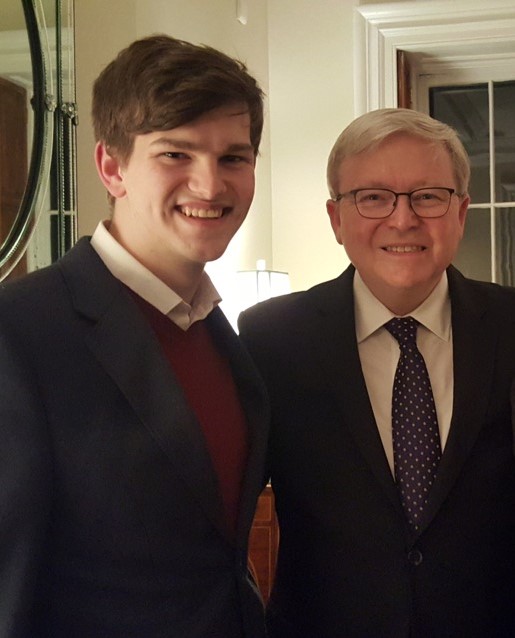
by Thomas Ashe | Feb 6, 2017 | Graduate Students, Internship Experiences
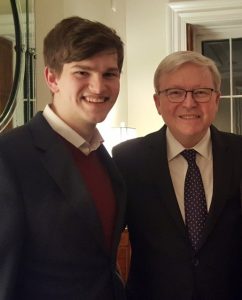
My name is Kevin Princic. I worked as an intern at the Asia Society Policy Institute in New York City. At Seton Hall University I am a second year graduate student pursuing a Master of Arts Degree in Diplomacy and International Relations with specializations in Foreign Policy Analysis as well as Global Negotiation and Conflict Management.
When applying to attend Seton Hall University’s School of Diplomacy and International Relations, I decided that one of the main goals of my graduate studies would be to branch out in my region of interest, Asia. I have studied Japan and China quite extensively; however, my knowledge of the rest of Asia was quite limited in comparison. With this goal in mind, I began my studies at Seton Hall but little did I know that my ambitions would lead me to an internship of a lifetime. At the School of Diplomacy and International Relations’ orientation, I first heard about the Asia Society from a colleague. She raved about her experience and encouraged me to apply for a position. This summer I took the plunge and applied to the Policy Institute and was so fortunate to receive an internship offer for the fall semester.
My work at the Asia Society Policy Institute has been instrumental in achieving my goal of becoming a well-rounded Asia scholar. One of the core responsibilities for interns with the Policy Institute is to conduct a press scan every day. Every Monday I began my day with a cup of coffee and several dozen news stories spanning all across Asia. It was duty to isolate the relevant stories, summarize them, and compile a list separated by sub-region. The final press scan usually contained around thirty different news articles. This task alone was instrumental in achieving my goal. Although I only completed the press scan on Mondays, I received it every day of the week from the other interns as well. This is just one of many instances in which the Asia Society is a full immersion learning experience.
I found that on more than one occasion that my work in the classroom at Seton Hall relates directly to my work at the Asia Society Policy Institute. For example, I was tasked with preparing a brief on North Korea’s nuclear programs and finding any related data. From my personal research I knew that this type of information was scarce due to North Korea’s isolationist nature. However, my relentless search proved fruitful for both myself and the Asia Society. The data I found helped me make progress on formulating my research design which will eventually become my Master’s Research Project and allowed me to provide a thorough brief to the Policy Institute. This is just one of many instances in which my work at the Asia Society and at Seton Hall intermingled.
The Asia Society Policy Institute is a think/do tank which makes it a little different from the typical think tank. My favorite aspect of the Policy Institute is its hands on approach to policy challenges in Asia. The Asia Society is also well known for its programming, bringing in prominent guests to speak on their research or practice. I was lucky enough to be working at the Asia Society as it held its United Nations General Assembly event series. During this series I assisted with events on topics ranging from North Korea’s nuclear program featuring both scholars and policy practitioners, to a dialogue on the Association of Southeast Asia Nations (ASEAN) 50th anniversary featuring delegates from several ASEAN states. The Asia Society even hosted the leader of Myanmar, Aung San Suu Kyi, who spoke on her efforts to democratize the country and reopen it to the world. Learning from these influential people through these events has been a truly unique and enlightening experience.
My experience at the Asia Society made me feel as though I am a part of something bigger that is having an impact in not only the United States, but also in Asia and even throughout the entire world.
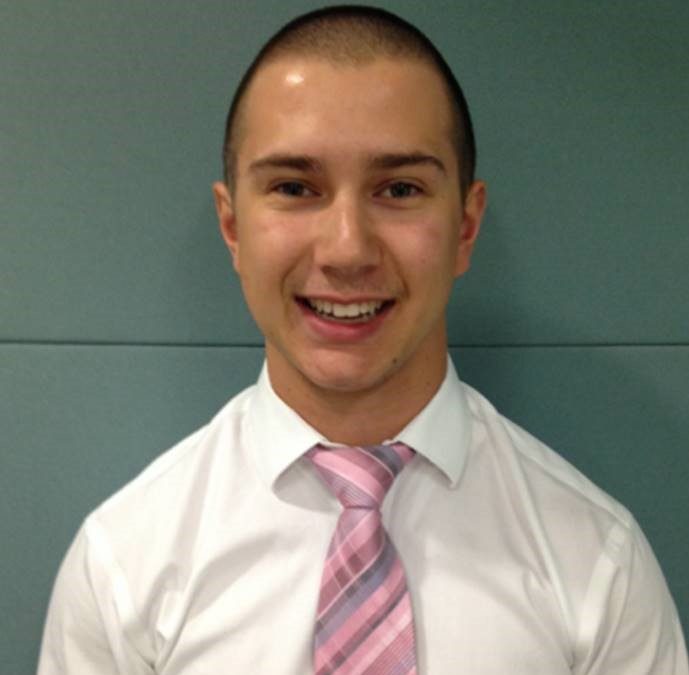
by Thomas Ashe | Feb 6, 2017 | Internship Experiences, Undergraduate Students
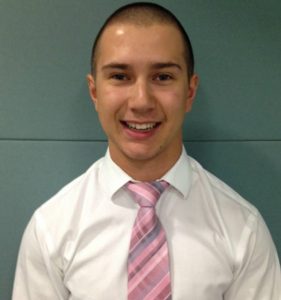 My name is Andrew Cameron and I am a senior Diplomacy and International Relations major. This past fall I interned at the Council on Foreign Relations (CFR) in New York City. My work at the CFR was a very educational experience that provided me with some amazing opportunities. The second week into my internship notably coincided with the annual United Nations General Assembly (UNGA) meetings! This was one of the busiest weeks for the Council due to the large number of heads of state, scholars, and diplomats who travel into the city.
My name is Andrew Cameron and I am a senior Diplomacy and International Relations major. This past fall I interned at the Council on Foreign Relations (CFR) in New York City. My work at the CFR was a very educational experience that provided me with some amazing opportunities. The second week into my internship notably coincided with the annual United Nations General Assembly (UNGA) meetings! This was one of the busiest weeks for the Council due to the large number of heads of state, scholars, and diplomats who travel into the city.
At CFR, I worked in the Corporate Department. Notably, CFR is far more than an organization that publishes Foreign Affairs magazine. With an elite corporate member base, my department regularly conducts events of varying sizes. Events range from conference calls where experts and senior executives weigh in from their offices worldwide, to large speaker seminars held at our Washington D.C. or New York office. The corporate department’s main function is to serve our members and educate them on international events. Proposed legislation, armed conflicts, and many other topics can be very pertinent to decisions companies make as they engage in global trade and commerce.
My position essentially comprised of two main job functions. The first area was logistics and event staffing. I had the opportunity to staff some very exciting events that included speakers such as then-Vice President Joe Biden to New Zealand Prime Minister John Key. For the most part I worked check in at the events, and I was then able to sit in on the meetings and work microphones during question and answer sessions. Given exposure to these very influential figures and having heard their ideas provided me with several exciting opportunities. To me this has definitely been the highlight of my position. Just as exciting was experience firsthand how the topics I have researched in my academic classes actually are discussed by high level executives and civil servants. For example, the New Zealand Prime Minister spoke to CFR about the Trans-Pacific Partnership, a trade agreement I wrote numerous papers on and discussed in many classes. Seeing how relevant my education is, and having the background knowledge to understand and analyze the statements made during these sessions is an extremely interesting and rewarding experience.
I definitely enjoyed my time at the Council on Foreign Relations. Getting a taste of the real world was an exciting adventure.
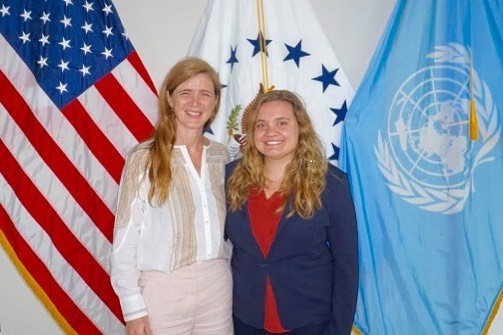
by Catherine Ruby | Sep 21, 2016 | Internship Experiences, Undergraduate Students
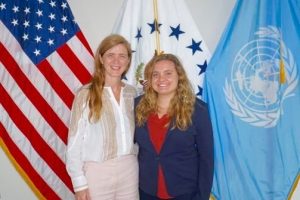
I interned for the U.S. State Department, Press and Public Diplomacy Office, at the U.S. Mission to the UN. This experience was a great one that not only taught me about work at the Department of State and the UN but also gave me my first insight into communications work, something I now consider a post-grad option that I never considered before.
Press interns at the US Mission have two main responsibilities including news monitoring and transcriptions. The Press Office is responsible for putting out verbatim transcriptions of U.S. ambassadors’ remarks at the UN and in other venues where they are operating in an official capacity. These remarks are released to the public and are government records, hence there is a high expectation of accuracy. Many reporters will ask the Press Office for transcripts of ambassadors’ remarks to include quotes in their articles. These reporters are often on deadline which increases the need for these transcripts to be done as quickly as possible. While our supervisors always checked our work before any transcripts were released, this task taught me a lot about how to work quickly under pressure while still maintaining a standard of excellence.
I also attended “brown bag lunches” that the Human Resources Department set up for the interns. We were able to have an hour long discussion with executives from different sections within the mission. This was an opportunity to learn from people doing work in all of the areas the U.S. Mission operates. We heard from many Foreign Service officers in the political and economic sections and what their responsibilities were in those areas. It was interesting to see how their work differed from the work of the Public Diplomacy officers that we worked with in press. My favorite part of these lunches was speaking with the economic officers as I am majoring in Economics as well as Diplomacy. One statement that stuck with me months later was from a discussion with an experienced economics officer who saw what she did as a form of ‘journalism’ for the government. These officers’ duties involve gathering information on the ground in whichever country they are stationed in and writing cables or “articles” that are then sent back to Washington. As someone who has always loved to write and even considered journalism as a career path, this was an eye opening conversation that showed me how I could combine all of my passions; economics, diplomacy, and writing; in a job with the U.S. State Department or another area of the federal government.
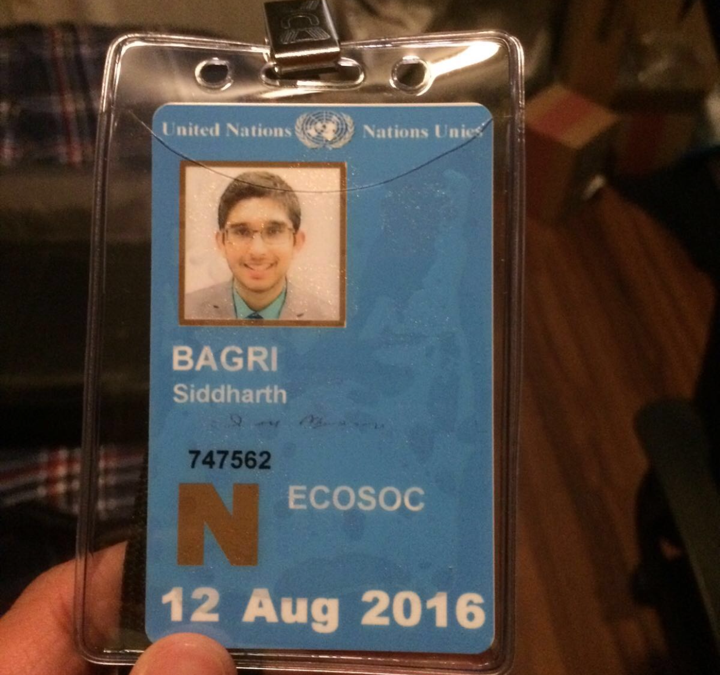
by Catherine Ruby | Aug 23, 2016 | Internship Experiences, Undergraduate Students
Working with Caritas Internationalis’ UN delegation with Mr. Joseph Donnelly gave me a close look inside the UN and on how NGO’s interact with the UN. Caritas is one of the world’s largest humanitarian organizations and much of my work involved researching and relaying information to my supervisor in order to help with his advocacy work. There was a focus on the current volatile situations in the 5 year old newest country, South Sudan, and the border regions of the country of Sudan itself. Sudanese forces have indiscriminately bombed civilians to the point where they have to retreat into caves in order to save themselves. Caritas is trying to provide aid to the people there but the government has also shown itself to be willing to bomb hospitals.
Caritas hosted the visit of a Sudanese Catholic bishop to advocate with UN agencies, Member States and NGOs about the sustained violence, intense human security and injustices taking place in South Kordofan, Nuba Mountains and Blue Nile regions. I scheduled meetings for the bishop. It was interesting to see how meetings are usually arranged in the UN system and I was surprised to learn how last minute some of them ended up being.
Organization is a key skill that I refined during this internship and I also sharpened my research skills. Towards the end of my internship I was asked to shift my focus to Latin America and the events going on there. I researched the current status of the historic peace process in Colombia between the government and the FARC after 50 years of fighting and a 2016 SC resolution/mechanism. This was an interesting experience, especially since I had to make sure that I filtered articles by date and made sure that my sources were reliable. This may sound like a straightforward and basic thing to do, but I realized that any mistakes that I made would have ramifications beyond me. This caused me to pay closer attention to small details.
I also learned to assess diplomatic language to a certain degree. I had the opportunity to attend meetings at the UN such as meetings in the ECOSOC chamber and the Security Council. Being able to hear how diplomats talk when they make speeches helped me navigate through the meanings beyond what was said. I am not exactly proficient at this, but it was a skill I previously did not have, and the more I refined it, the more interesting those meetings became.
My biggest takeaway from this internship would have to be a newfound appreciation for the UN and the various organizations that participate in the system. In the past, I was quite critical of the UN. I never thought that it should not exist, but I did think that the political dimension of it was a dead end that never seemed to work. The humanitarian work that the UN provided was the only thing it seemed to do better than anyone else, but since working at the UN I have come to realize that the UN is not a monolithic entity. Organizations like UNICEF are technically separate from the UN bureaucracy and so is the Security Council.
I realize now that the UN has taken the fall for many mistakes that originated from the member states, and that the UN is only as strong and as effective as the member states want to be. Politics certainly gets in the way of many of the initiatives that the UN tries to undertake, but the UN is still able to function despite the obstacles. I had never really considered the UN as a possible career path, but now that I have completed my internship there, I would not mind searching for a job there.
I would definitely recommend this internship to others. Perhaps they will walk away with a greater appreciation for the UN, as I did.
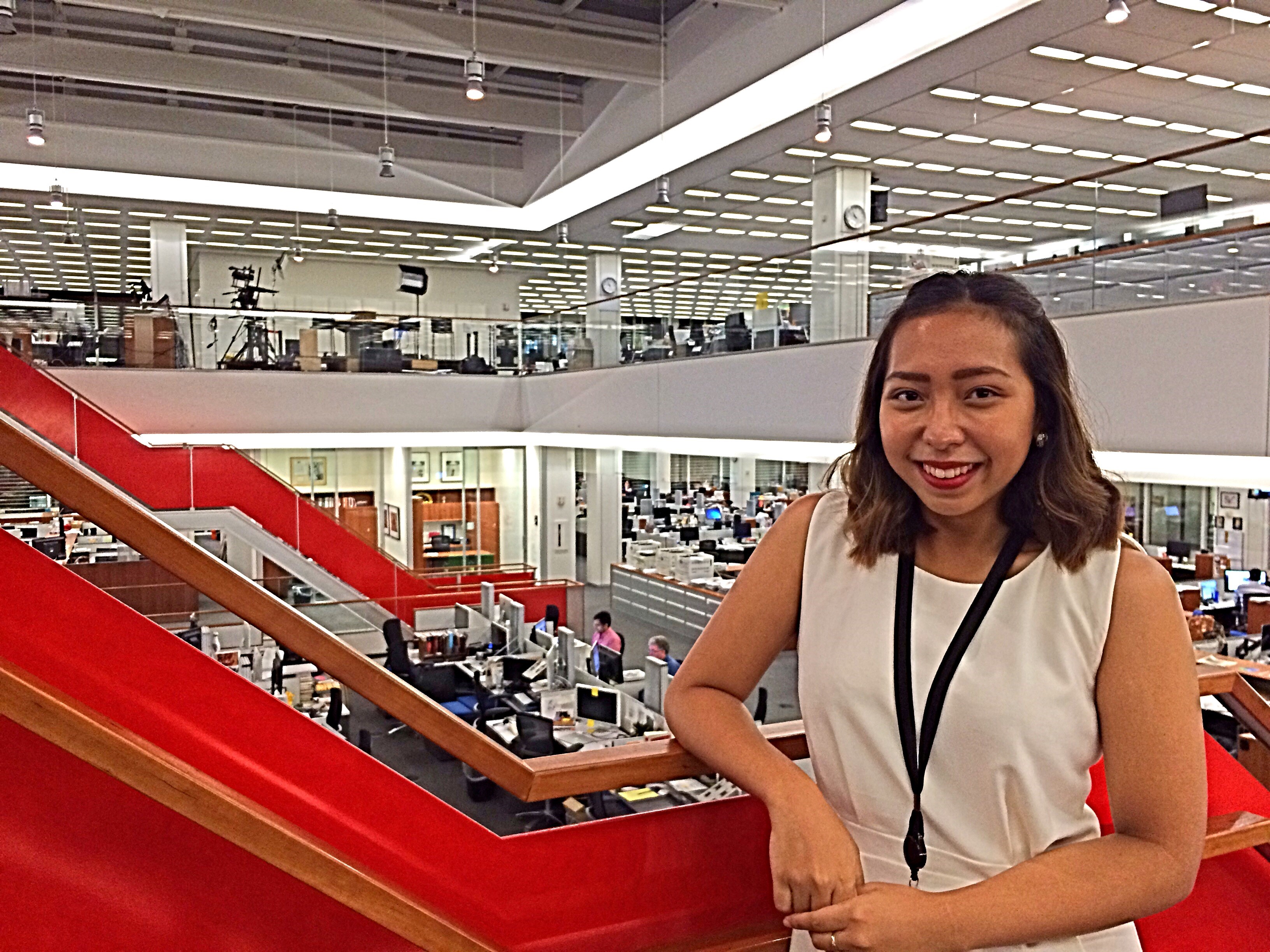
by Catherine Ruby | Aug 18, 2016 | Internship Experiences, Undergraduate Students
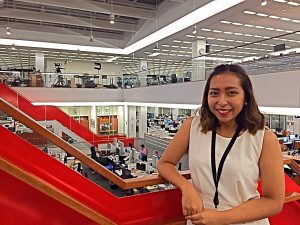
After Deadline – My Summer at The New York Times
I started my internship at The New York Times on the day of the Orlando attacks, the worst mass shooting in United States history.
Or maybe this thrilling summer began in May, when I spent a week at Temple University with 12 other lucky souls in what was, basically, editing boot camp – seven days that began with a wakeup call at 6 a.m. and ended after falling asleep on my books well past 1 a.m.
Let’s go even further and say the adventure started in December, two weeks before finals, when I got a phone call from a kindly old man who told me out of the blue that he would see me in Philadelphia. Confused, I asked, “Excuse me, what is this for?” And Professor Edward Trayes said, “Oh, The New York Times is looking to pay you $1000 a week to be an editing intern – does that sound good?”*
But this story really kicked off when I spent the entire month of October reviewing for the Dow Jones News Fund copy editing test – a tear-inducing, confidence-busting exam that around 1000 applicants subject themselves to every year, just for a shot at the world’s greatest bastion of journalism.
I thought I’d flunked the test, which made the call from Dr. Trayes all the more surprising. At that point, I would have been happy to be assigned to any desk at the Times, but Dr. Trayes thought I would be a good fit for the Foreign/National desk – or, paradise for an international relations major observing her first U.S. election.
Foreign/National was inundated by so much bad news this summer (multiple bombings, multiple shootings, multiple email scandals from the Democrats, multiple gaffes from Donald Trump) that one of the staff editors, a former Dow Jones intern, said, “Francesca, this is the no-joke desk. You should be proud of yourself for surviving this summer.”
Honestly, I’m just relieved I survived the hours: I worked on Saturdays from 9:30 a.m. to 4:30 p.m., then on Sundays to Wednesdays from 4 p.m. to 11 p.m.
A lot of things copy editors do are easier said than done – for example, writing a headline that is punchy and attention-grabbing and an accurate summary of the story while staying true to the lofty Timesian tone and fitting into the allotted layout perfectly is an art form.
The challenge for us interns was to make it on “After Deadline” – a weekly list on the Times’s internal blog that recognizes the past week’s best headlines. Only one out of nine ever made it (spoiler alert: it wasn’t me). Getting my first headline through to print had been hard enough, but it finally happened on a story about Hillary Clinton and Elizabeth Warren. My proudest achievement, though, was on the first night on the Democratic convention: I wrote the headline for a story about Michelle Obama’s relationship with Hillary Clinton, and for a few hours that night, it was the first hit on Google if you searched “Michelle Obama.”
There are many things that people don’t realize about newspapers. The locations you see at the top of the article? Those are called datelines, and they indicate that the reporter was actually on the ground. But that doesn’t mean real journalism is putting on a helmet and running around a war zone with a GoPro. Some budding news websites like to put reporters in the center of the story, producing content such as “Here’s What Happened When I Had Dinner with a Taliban Leader,” or something like that. The New York Times is the only legacy newspaper that still maintains an extensive international staff in bureaus throughout the world, and reporters are assigned to a region for extended periods, not just for one-day trips.
The highlight of my internship with the New York Times was when I met Azam Ahmed, the bureau chief formerly in Kabul and now in Mexico City. I was excited not only because he was a foreign correspondent, but also because he had written the article on Taliban justice that inspired my thesis. Talking to him made me want to be a foreign correspondent all the more. You could read every academic paper about Afghanistan, but an ivory tower academic will never be able to tell you about Afghanistan the way a journalist on the ground can.
Of course, it’s going to be a while before I’m anywhere close to being worthy of Azam’s credentials.
But this summer at The New York Times was an important stepping stone, and I am grateful to have experienced how a world-renowned newsroom with the highest standards works. Now it falls on me to build my street cred as a journalist and, hopefully, work my way back to the august institution on Eighth Avenue.
*I kid you not – this was how the conversation actually went.
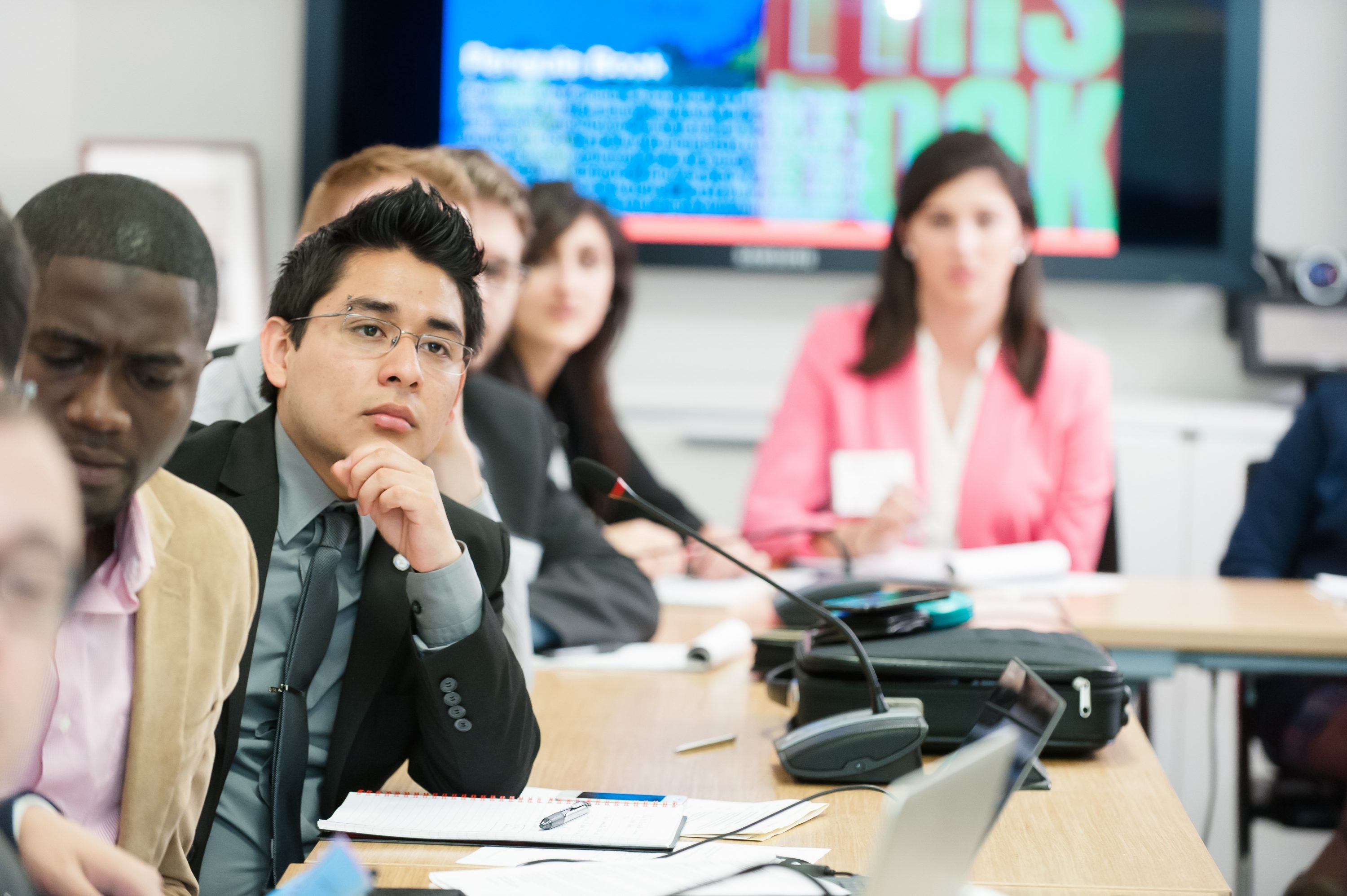
by Catherine Ruby | May 5, 2016 | Internship Experiences, Undergraduate Students
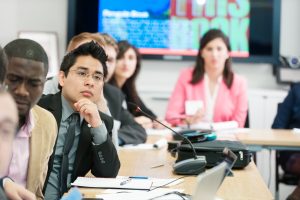
My name is Jose, I am a junior at the School of Diplomacy with a deep interest in the Latin American region. I intern at The Network for Religious and Traditional Peacemakers (the Network). This organization is led by Antti Pentikainen and funded by the Government of Finland. Its purpose is to work with small communities, and religious and international leaders to promote peace around the globe. I would like to give you an insight of my ongoing journey as an intern and share with you my experiences during the spring 2016 semester.
As an intern, my priority is to keep abreast of the initiatives that the Network has implemented, and collect information used for the Network’s newsletter. Additionally, I am occasionally assigned to cover conferences related to the objectives and core values of the network. Since the Network is an NGO registered with ECOSOC at the United Nations, I have a grounds pass that allows me to have access to open meetings. During the first two weeks of the internship, I attended conferences at the International Peace Institute and at the UN Headquarters. At first, I took notes and briefed Mr. Pentikainen. Then, as I met more members of the Network, I began to learn from them and became comfortable with expressing my ideas. As a result, I volunteered to attend conferences of pertinent topics and submit my own articles for approval by the Network’s secretariat. This was an important step because an intern is widely stereotyped as someone whose responsibility is making copies or getting coffee, someone who is consistently told what to do. Be that as it may, in order to stand out, it is our responsibility to convert from knowledge-consumers to knowledge-producers.
During my hiring interview, Antti Pentikainen, the Network’s Executive director, asked what my dream job or goal was. I said that I would like to be part of the mediation process at the UN, but acknowledged the challenges of dealing with the elites at the global level. For that reason, I would rather focus on a region where my contribution may have a sustainable impact for peace and conflict resolution and not be seen as a quick fix. “If you want to work at the UN, you have to make yourself relevant” said Antti as he offered to facilitate a conversation with experts that could point me in the right direction. On February 15th, the Network’s core members gathered in the NY headquarters to talk about what the current Network’s status was and the direction it was expected to go in. Martine, a member and expert on South Asia, asked me if I thought I was being utilized constructively as an intern. I had been interning for just two weeks, so I did not know how to respond to that. “When I was an intern I brought my boss a proposal of three things I wanted to work with. I recommend you do the same in the area you’re interested in, especially Latin America where the Network’s presence isn’t as strong,” said Martine after my long pause. Although with a different angle, Martine’s advice reiterated what Antti said to me the first day I met him: “make yourself relevant”.
That same day, I talked to Antti and asked for two things: The first is that I wanted to be more involved in the Network’s affairs in Latin America; the second was that I wanted to write short articles about the conferences I attended as long as they were related to the organization’s core values, and hence could potentially be incorporated into the newsletter. I was expecting a long diplomatic, eloquent answer that politely declined my ideas. Instead, I got an “okay” followed by a smile and was Cc’d on an email in which I was recommended to provide assistance to a Network affiliate with a strong presence in Latin America where.
Currently, I am helping with the coordination and logistics for conferences and projects dealing with stability in the Americas and have access to information that isn’t always readily available in mainstream media or simply disregarded because of other issues that dominate the headlines. As for attending conferences and writing my own articles, I will be traveling to Washington DC to cover the gathering of leaders from several religions in the Americas. I am also working with Religions for Peace staff in the preparations of a panel where I will be the moderator.
It has been difficult to balance it with schoolwork, but I enjoy every day I spend at my internship. I was extremely lucky to have met a staff that treats me as if they had known me for years and a humble boss who treats others like family and who is always there to help me. Being an intern at the Network requires a lot of work, time and dedication, but the experience they offer is immeasurable.
For anyone who wants to intern in New York, particularly during the spring semester, I have two recommendations that will help you grow and, perhaps, survive:
First, do not be afraid to offer assistance, ask questions, or be the first one to raise your hand if there is an upcoming project that may be of interest to you, provided you’re able to deliver good results.
Second, after snowstorms, bring your dress shoes and an extra pair of socks in a bag, you may need them.
I hope you enjoyed reading about my journey thus far at the Network as much as I have enjoyed working for them. If there is anyone interested in becoming a part of this team, or if there are any questions, I am more than happy to answer them; working here has given me far more joy than I ever imagined and I’m sure you’d feel the same way.
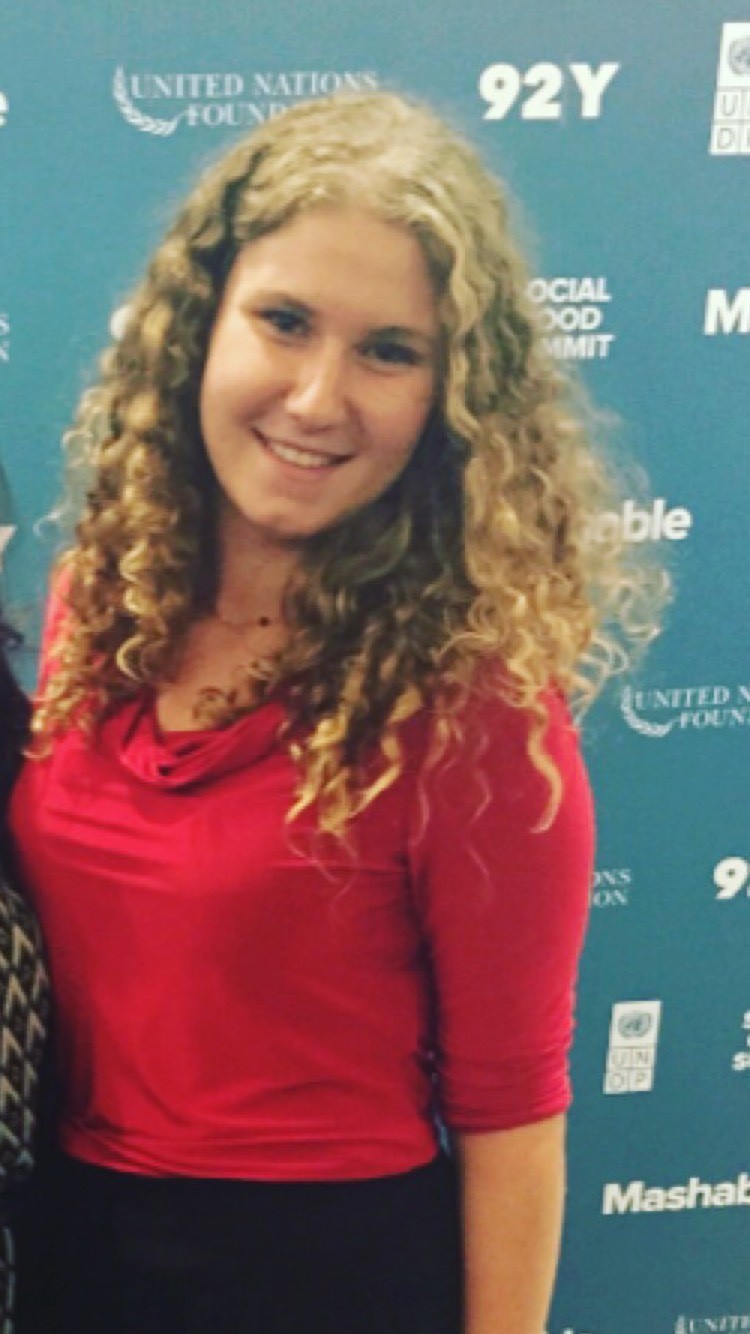
by Carolin Braxenthaler | May 5, 2016 | Internship Experiences, Undergraduate Students
My name is Elaina Estrin, I am a junior at the School of Diplomacy and International Relations, with minors in Economics and Modern Languages. I am interning with the United Nations Foundation (UNF) as a United Nations Relations and Policy intern. UNF is a nonprofit organization that combines the work of the UN with the work of others around the world to help tackle global issues.
One of my main responsibilities is to compile the daily update that is sent out to UNF staff and partners. The daily update includes any new information put out by the UN, including new appointments, reports released by various UN missions, updates from UN organizations, all briefings conducted at the UN, as well as any up to the minute news from countries in conflict around the world. This newsletter is a great source of news for anyone working in or with the UN. Other responsibilities at the UNF also include attending events at the UN that align with the goals of UNF, compiling briefings, and updating the staff about these events. I have been able to follow announcements on the Syria negotiations, post Paris Agreement talks, highlights of Davos (the World Economic Form), humanitarian financing, events predating the World Humanitarian Summit, and the Secretary General’s Plan of Action to prevent violent extremism just to name a few.
My classes at the School of Diplomacy have guided and prepared me for this internship opportunity. From classes like International Relations, which laid the groundwork for my knowledge in the field and introduced me to some of the issue areas that I am most passionate about today; to Institutions of Global Governance, which introduced me to the different actors in the international system, global problems, and global policymaking. The School of Diplomacy also introduced me to Public International Law and how different agreements at the UN translate legally, as well as what constitutes a human rights violation or a war crime. This understanding of the international community and international law is vital to work in the fast-paced environment of the UNF.
When UNF was first launched in 1998, its main purpose was to support UN causes. Over the years, UNF’s role has transformed from encouraging support for the UN to creating huge global campaigns in partnership with the UN on some of the biggest issues that humanity is facing in the 21st century. A lot of the work I do is in support of the new Sustainable Development Goals (SDGs), which are the world framework for the next 15 years. Some of the other issues UNF focuses on are child health, climate change, energy, technology, women and girls, and population.
I not only learned about the inner workings of a nonprofit organization, but also about the UN and its noble causes. Interning with UNF greatly improved my writing and critical thinking skills, which will be valuable in any profession. The knowledge I gained from researching different international issues for UNF has been the biggest takeaway; it has increased my passion and drive to create change for women and girls an in education.
by Catherine Ruby | Jul 1, 2013 | Graduate Students, Internship Experiences
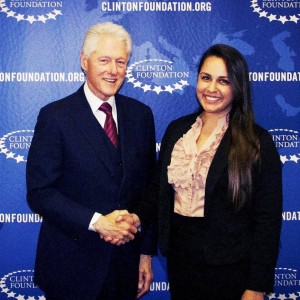
School of Diplomacy alumna Mery Arcila, M.A. ’13, interned for the Development and Philanthropy department at the Clinton Foundation in New York, NY during the Spring 2013 semester. Mery assisted the Development team in fundraising campaigns through events for the Millennium Network as well as the online giving programs. Mery had the opportunity to meet with former U.S. President Bill Clinton during a brown bag lunch event at the Foundation. This is the fourth year that The Clinton Foundation has partnered with the School to support student interns. The Clinton Foundation was established to improve global health and strengthen economies in local communities around the world; learn more via http://www.clintonfoundation.org/.













